Cheaters Never Win! ... Or Do
They?
Written by Rick Archer
October 2014
|
Forward
The
1993 HBO movie titled “And the Band
Played On” dealt with the early days of AIDS
- the denial, the confusion, the mystery, the horror.
Many things about the movie disturbed me greatly, but there
was a subplot that has never left my mind. To me, the
most disturbing part of the movie were the
strong allegations that an American doctor working for the National
Institute of Health tried to steal credit for the discovery of the
AIDS virus.
The movie made it clear
that while people were dying left and right, Robert Gallo, a
prominent medical researcher took advantage of the findings of
French scientists to suddenly proclaim the AIDS virus had been his
discovery all along.
As I watched the
movie depict this man's pathetic
grab for glory, I could not help but think of all the people
in the world who try to get ahead by climbing the shoulders of other
people who are trying to do the right thing.
I have long been
fascinated with ethics and morals. Two years ago I wrote a long
article about
Joe Paterno, a childhood hero of
mine. After extensive research, I came away totally convinced that
Paterno allowed a Minotaur-like monster named Jerry Sandusky to
systematically use his Penn State connections to lure little boys
into locker room showers. By turning a blind eye to one warning
after another, well over a dozen poor little boys saw their lives
ruined by the monster.
It was more important to
Joe Paterno… a man who had spent his entire career proclaiming his
moral virtue… to protect his own lofty reputation and career than
to do the right thing. I came away from the story full of disgust.
The ethical lapses that took place in the
AIDS situation had similarities to the Paterno
situation. There are people in this world
who will always put themselves above others in their drive to 'win'.
I wonder if the human
race will ever learn to work for the common good.
|
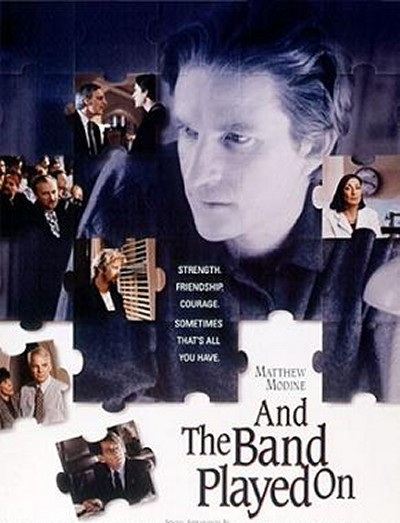 |
| |
|
“Cheaters never win.”
That axiom has been
drilled into most people since from the moment they could speak.
I don’t know about you,
but I am not so sure I believe that is true. I would imagine
‘cheating’ improves one’s odds of winning dramatically. That
explains why there are so many cheaters in the world.
I think a lot of it boils
down to one’s conscience. Some people feel remorse if they commit a
crime, some people could care less. I am sure the same thing could
be said about cheaters.
I once cheated on a
German test in high school. I was mad that they made us memorize
the names of famous German authors. I was taking
German to learn how to speak it, not some German Lit class.
How stupid was that? That’s what I had an encyclopedia for.
So I just copied the names down and saved myself ten minutes of
memorization.
At the end of the year, I
was given the award as the best German student in the school. And
all I could think about as I accepted the award was that I had
cheated on that test. It was a hollow victory indeed. I could not
get those thoughts out of my head. I was crestfallen to realize I
had cheated myself out of the pride I deserved to feel. I learned
a valuable lesson.
However, like I said, not
everyone has a conscience.
|
 |
| |
|
Business Ethics
Cheating
in the business world goes on all the time. People talk about
“business ethics”. How utterly absurd. People cheat in the
business world any time they think they can get away with it.
One way people cheat in
business is by not paying their bills. Another way people cheat in
business is spying on their competitors. Some companies don’t think
twice about tricking their stockholders by publishing false
reports. Think Enron. And of course many bigwigs use insider
information to milk the stock market.
“Business ethics.” Give
me a break. The only thing that stops most people from cheating is
the fear of being caught.
It really does seem that
ethics in business have fallen to an all-time low. I
once noticed a blurb in Time Magazine that
said “24% of Wall Street executives say that illegal or unethical
conduct may be necessary to be successful in finance.”
I think that statistic
vastly underestimates the truth of the matter. There’s an old
saying… “I’m just one stiff drink from telling you what I
really think.”
Give those same Wall
Street executives a few stiff drinks and my hunch is that percentage
would quickly rise well above “24%”.
People
cheat to succeed in their careers all the time.
Pyramid schemes,
lying on resumes, selling company secrets, hacking, income tax
evasion, shell companies to avoid taxes, defaulting on business
contracts, non-payment of bills, insider trading... the list is
endless what people will do to 'succeed' in the business world.
|
 |
| |
|
Rick Archer's Note:
Here is a comprehensive article that explains the controversy
between Montagnier and Gallo.
Who
Discovered HIV?
By Lisa
Rainey
06 July 2006
The origin of AIDS
has presented numerous puzzles to scientists since the first
recognized cases appeared in the early 1980s.
Until 1984 its cause
was the subject of fierce debate. Scientists, public health
authorities and gay community leaders blamed everything from a
promiscuous flight attendant to a suspect experiment involving
the clotting factor given to hemophiliacs.
|

Luc Montagnier and
Robert Gallo
|
No one could be sure
what the true origin was.
There was a
possibility later proven to be the case that a handful of cases
known in 1981 were the first of many, that an infectious agent
was responsible. At the time, health experts had no idea
how rapidly the disease was spreading. It so happened that the
new syndrome exceeded their worst fears.
That report produced a
crescendo of activity by researchers. And in the search for the
cause of AIDS, two labs and the titanic egos of the men that ran
them took center stage.
Dr. Luc Montagnier of the Pasteur Institute in Paris and Dr.
Anthony Gallo of the National Cancer Institute in Washington
both raced to find the cause of the disease.
On January 23, 1983, Montagnier found a suspect virus he
called LAV (Lymphadenopathy Associated Virus). Montagnier
published his findings in May 1983 so that other researchers
could test his results, a standard procedure.
In July, the Pasteur Institute sent a sample of LAV to Gallo.
Another sample of LAV was sent in September, and by December,
Gallo’s lab was successfully cultivating LAV.
But Gallo had his own theory of what caused AIDS. A few years
earlier, in his search for the cause of cancer, Gallo had
discovered two retroviruses that looked similar, which he called
HTLV-1 and HTLV-2 (Human T-cell Leukemia Virus). In December
1983, he submitted a paper for publication proposing the theory
that an HTLV-type retrovirus was the cause of AIDS.
Then, on April 23, 1984, Margaret Heckler, the secretary of
health and human services, announced that Gallo had isolated the
virus which caused AIDS, that it was named HTLV-III, and that
there would soon be a commercially available test able to detect
the virus with “essentially 100 percent certainty.”
Dr. Gallo stood before the press conference at the National
Cancer Institute to announce that he had discovered the virus.
What he neglected to mention was that Montagnier had also
identified what turned out to be the same virus. The two
institutes had previously shared samples; they agreed to publish
together and even make a joint announcement. But when the press
got wind of the news, the NCI felt compelled to proceed without
the French.
“If I could relive those days, I wish they had been at the press
conference,” Gallo said. “I was a little swept away.”
At the press conference, Gallo showed pictures of HTLV-III. But
it didn’t look anything like HTLV-1 or HTLV-2, and it was hard
to see how they could be of the same family. As it turned out,
the picture of HTLV-3 was actually a picture of the LAV virus
sent to Gallo by Montagnier.
The cause of AIDS had been discovered by Gallo. Or was it?
The French didn’t think so. The picture of Gallo’s HTLV-3 was
indisputably a picture of Montagnier’s LAV virus.
On the same day Gallo announced that he had found the cause of
AIDS, he filed a U.S. patent application for a blood test that
would detect signs of the virus in people.
By May 17, private companies were already applying for licenses
to develop a commercial test that would detect evidence of the
virus in blood. In addition to its usefulness for patients, a
test was wanted to screen the nation’s supply of donated blood.
In 1985, a blood test, ELISA, became available that measures
antibodies to HIV, which thereby detects the body’s immune
response to HIV. This blood test remains the primary method for
diagnosing HIV infection.
But there was also considerable and often acrimonious
controversy, including accusations that Gallo improperly used a
sample of HIV produced at the Pasteur Institute.
And so began a three-year, high-level diplomatic negotiation
between the U.S. and France.
The controversy which would embroil the American scientist’s
career for almost the next decade began when the United States
government denied the French scientists a patent for the AIDS
test and awarded one to Gallo’s team instead. The patent would
be worth about $100 million a year in sales and $100,000
personally to Gallo. (click here for
Complete Story)
|
| |
|
All’s Fair in Love and War...
or is it?
|
There’s cheating in romance. That goes on all
the time.
I suppose some women can be
just as guilty as men, but my experience is that "men" do the
preponderance of the cheating.
Like 99% of the human race,
I have been cheated on. The first time it happened, I was
beyond devastated. I was so badly blind-sided that it took me
years to recover my confidence.
However, as our good buddy Friederick
Nietzsche would say, "That which doesn't kill you makes you
stronger."
I survived and became
much wiser for the experience.
Knowing how much pain I
felt, I have been reluctant to inflict a similar blow to the women I
have cared about. Thanks to a strong conscience, I have always
made it a point to not lie to women. Unfortunately I cannot
say the same for my fellow man.
|
 |
Rick's Note: The following is an interesting article on
the subject of cheating.
Three men got together and wrote a manual on how to cheat on women.
A female writer named Anka Radakovich reviewed the book and wrote
this article for British GQ in October 2013.
Oh,
Come All Ye Faithless
Written by Anka Radakovich
Source:
British GQ
For anyone dying to cheat, thinking
about cheating or just wondering how other people cheat, a new
book has been published telling you how to do it without getting
caught. Cheat: A Man's Guide To Infidelity (Simon & Schuster,
£18) is written by three stand-up comics and admitted "scumbag
cheaters" who will teach you how to cheat successfully. "We're
not telling you that you should cheat," say Bill Burr, Joe
DeRosa, and Robert Kelly, "We're telling you how to cheat. But
if you do get caught cheating, don't start whining that 'the
book made me do it'."
As a single woman reading this book, my big question is: if you
spend so much time coming up with elaborate strategies to cheat,
why don't you just break up or get a divorce? The rationale of
the men who wrote the book goes like this: "This is information
you need, especially in these harsh times when... demands of
forty grand a month in child support... [is] not considered
highway robbery." (When I interviewed married men who cheated
with married women on a "married but dating" website and asked
why they didn't get a divorce I got the same response: "She'll
get half my income, the house, the kids, and the dog.")
The book is written both for married men who want to cheat on
their wives and for single men who want to cheat on their
girlfriends and put other girls on the "rotation". The authors
warn that there is anywhere from a low to a high possibility of
getting caught, so getting busted is "part of the game" and the
high stakes "makes a caper so god-damn exciting". The three
veteran cheaters have come up with a step-by-step guide through
the entire process of cheating, from "choosing your mark" to
keeping the glitter out of your pubes.
The first step in the process is "letting go of shame and
guilt". The second is "avoiding the truth". To get into cheating
mode they recommend saying out loud, "Cheating is not my fault."
They also recommend being totally honest about your dishonesty
with the person you are cheating with. Suggested dialogue would
be "I'm already in a relationship, but it's 'damaged' and not
doing well." Then if she agrees to have sex with you, you cut
her off afterwards and tell her that your girlfriend found out
and is now mad at you. This avoids the drama of your new
girlfriend finding out and hitting your car with a baseball bat.
Other cheating tips include using Facebook "to troll for some
ass", keeping your mouth shut, avoiding witnesses, such as nosy
neighbours and doormen, and never ever bringing your cheat back
to your place because your girlfriend or wife could find a hair
extension or the dreaded "lone earring" in your bed.
The book also goes into detail on how to negotiate Asian massage
parlours, escort services ("the last resort"), "casino whores"
in Las Vegas, brothels in Nevada, and "women of the night" in
Rio: "Take a cab everywhere, know the place you are going to
before your go... [or] have the girl come to you. If you do all
that, you should have one of the most amazing times of your
sexual life in Rio de Janeiro, otherwise known, to the truly
deviant, as the Motherland."
Halfway through reading the book I had a horrifying revelation.
On more than one occasion, unbeknownst to me, I have been what
the authors refer to as "side puss" - just as I thought things
were going well in my exciting new "relationship", the guy
disappeared. This was confusing at the time, especially because
one guy told me I "was the best sex he ever had" and that I gave
him "the best BJ of his entire life". The authors' recommended
way to cut things off is to "just disappear". No more phone
calls, texts or emails. "Be ice cold," they say. "Wow. We're
assholes."
Texting is the communication of choice for the major cheater. "A
great time to... set up a cheat," they report, "is while you're
watching a sporting event on TV. Your girl will think you're
texting your 'bro' about the game, when you're really setting up
some ass."
They also tell you who not to cheat with: the chick at work
"[because] it will eventually dawn on you that if this girl
wants to, she can call your girlfriend and tell her everything";
the chick at the gym "because you are definitely going to see
her again"; your girlfriend's roommate or best friend; your
neighbour; and a married woman "[because] her husband [could]
burst into the room and shoot her through your back".
Near the end of the book they concede that "a relationship is
over the second the trust is gone", and that you are cheating
because you are missing the passion and sex you deserve in a
relationship. That's when they suggest using the "Romantic
Cheater" method and saying to your cheat, "'I haven't felt this
way in a long time.' Translation: 'I want to put my penis in
your mouth and then f*** you in the backseat of my Chevy and
then go home to the woman I love.'"
After reading a book about how men can cheat the right way (like
Frank Sinatra) and avoid doing it the wrong way (like Arnold
Schwarzenegger) I now have to order four more books just to
recover:
• Is
He Cheating On You? 829 Telltale Signs
• Spying On Your Spouse: A
Guide For Anyone Who Suspects A Partner Is Cheating
• The 30-Day Love Detox:
Cleanse Yourself Of Bad Boys, Cheaters, And Men Who Won't Commit
• and the book I will read
first... Dump His Ass
|
| |
|
Charles Van
Doren
There
seems to be plenty of cheating when large sums of money are
involved. One of my favorite movies, Quiz Show, details the
story of how a remarkably talented man, Charles Van Doren, was
persuaded by the directors of the TV show
Twenty One into cheating.
|
The film chronicles the
Twenty One quiz show scandals of the 1950s. It focuses
primarily on the rise and fall of popular contestant Charles Van
Doren after the rigged loss of Herb Stempel, who was extremely
bitter over his fate.
Stempel was brilliant,
but not very sexy. He was ordered to lose. It didn’t help his ego
that his successor Charles Van Doren was so handsome and charming.
The ratings when Van Doren was on were astronomical. Van Doren won
several times in a row strictly on merit. However, once his
popularity kicked in, the producers could not bear the thought of
Van Doren ever losing.
Consequently, they began
to feed him the correct answers before the show even started. The
producers were just as much a bunch of crooks as Van Doren was for
cheating. Only one problem – Stempel was furious at getting the
short end of the stick, so he went out and found someone to
investigate. Congressional investigator Richard Goodwin's
subsequent probe revealed the truth and exposed Van Doren.
Charles Van Doren was the
son of Pulitzer Prize-winning poet, literary critic and educator
Mark Van Doren. There is a scene at the end of the movie where
Charles Van Doren has to face his father, a man who was famous in
his own right, with the truth. The disappointment written on the
face of Van Doren’s illustrious father is so profound that I would
never want to get stuck in a similar situation for all the marbles
in the world. The father’s expression of pain told the story –
here was a son so smart he didn’t need to cheat, but he did it
anyway.
Charles Van Doren was now
forced to endure both the most excruciating public humiliation and
private humiliation imaginable. And, unfortunately, Van Doren
appeared to have a conscience. In his case, it is definitely true
that cheaters never win… especially when they are caught!
|
 |
| |
|
Money is the Root of all Evil
Back in 2001 over in the
United Kingdom, a man named Charles Ingram cheated on the show “Who
Wants to be a Millionaire?” and won a million pounds for his
efforts. Only one problem – he got caught. After originally
winning £1,000,000, the prize was cancelled after it was revealed
that Ingram had cheated his way through most of the questions.
Ingram’s secret was to
name all four choices aloud and wait for confederates in the
audience to cough after the correct answer. Since the show was
taped, once the allegation of cheating was raised, both video and
audio replays confirmed the systematic cheating. TaTa to the big
prize.
However, it is a little more difficult to
judge the value of cheating for those who are not caught, isn’t
it? Maybe those cheaters do win.
|
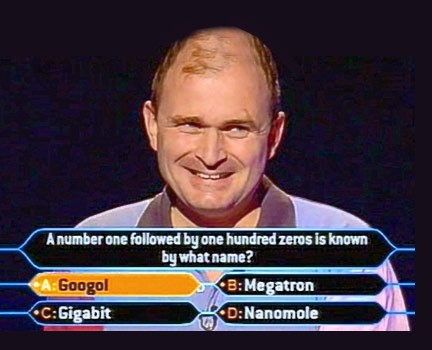 |
| |
|
Leona Helmsley
|
|
It would be interesting
to hear the story of a cheater who “got away with it”, but rumor has
it that people who ‘get away with it’ have a disappointing habit of
keeping their mouth shut. ‘Silence’ seems to be one of the ways
people get away with it. What a shame because we lose out on some
great stories that way.
And then there are others
who just can’t seem to keep their mouth shut. They try to get away
with it, but their ego is so huge that they think they can say and
do whatever they want without consequence.
They act like they are
above the law. The rules don’t seem to apply to them.
One famous example of someone whose
big mouth prevented her from ‘cheating and getting away with it’
would be Leona Helmsley. ‘Cheating’ was at the very core of her
personality.
Gordon Gekko, the
sinister inside trader in the movie Wall Street, was a
fictional symbol of the “Greed is Good” ethos of the Eighties.
For people who preferred
a living, breathing embodiment of the same ethos, they had Leona
Helmsley, the legendary Queen of Mean.
Leona Helmsley’s trial in
1989 for tax evasion was a delicious toast to the decade of
decadence,
Helmsley’s big mouth
offered up for the average person the guilty pleasure of watching
the Queen of Mean, outrageous, nasty, and entitled, take a
precipitous fall from the penthouse to pen house. Imagine the blow
of being forced to swap a 10,000-square-foot Park Lane penthouse for
a prison cell. Talk about mental cruelty! And here we thought
there were laws preventing cruel and unusual punishment. Guess not
in Queen Leona’s case.
Helmsley was a famous New
York real estate mogul who lived the American Dream. Her early
story was taken straight out of a rags to riches saga.
|
 |
In fact, if she wasn’t so
downright cruel, Helmsley could have been someone we admired. She
was a person who got somewhere by hard work, savvy career moves,
good looks, and sleeping with the right married men.
Leona Helmsley was richer
than King Midas and lived high and mighty. Too bad she had to spend
18 months in prison. That definitely rained on her parade.
Leona was a divorced
sewing factory worker with mouths to feed before she met and married
real estate tycoon Harry Helmsley (the fact that he was already
married mattered little).
In 1980, Harry named his
wife Leona as the president of his opulent Helmsley Palace Hotel.
Helmsley ruled her domain like a despot. Her tendency to explode at
employees for the smallest infraction earned her the title "Queen of
Mean." Her employees feared her so much that they actually
developed a warning system to announce her impending presence.
The slightest mistake – a
crooked lampshade, unseen dust under a desk, a discarded toothpick
in the corner - was considered grounds for firing. In the process,
Helmsley was known to shout insults and obscenities at targeted
employees just before they were terminated. It wasn’t enough for
Helmsley to pick on underlings too intimidated to speak back, she
wanted to make sure they were humiliated in the process.
Leona Helmsley was
clearly a bully of the worst sort. But she had
a fatal flaw. Helmsley was not only arrogant, she had an
obsession with avoiding taxes.
Helmsley once purchased
hundreds of thousands of dollars’ worth of jewelry from Van Cleef &
Arpels, but said she preferred not to pay sales tax. So she
persuaded two senior store officers to let her walk out with the
jewels without paying thousands of dollars in New York City tax.
The officers got around charging her the city taxby recording it as
an out-of-state purchase. To cover their tracks, they mailed empty
boxes to her out-of-state address.
Only one problem. The
officers were under careful surveillance. Caught up in a sting
involving these two employees, Helmsley received immunity for
testifying against the jewelry-store employees. They went to jail
and she went scot free.
In 1988, Leona and Harry
were indicted for a smorgasbord of crimes, including tax fraud, mail
fraud, and extortion. Despite the Helmsleys' tremendous wealth
(net worth well over a billion dollars), they were known for
disputing payments to contractors and vendors.
One of these disputes
would prove to be their undoing.
In 1983 the Helmsleys
bought Dunnellen Hall, a 26-room mansion in Greenwich, Connecticut,
to use as a weekend retreat. The property cost $11 million, but the
Helmsleys wanted to make it even more luxurious than it had been
before. They spared no expense.
In the process, they made
two mistakes. First, the Helmsleys were very reluctant to pay their
astronomical bills. The remodeling bill came to $8 million, which
the Helmsleys were loath to pay. They felt like they had been
overcharged and taken advantage of. Mind you, these people were
worth over a billion, but they had a large frugal streak especially
when it came at other people’s expense. After all, a million saved
is a million saved. I suppose everything is relative.
A group of contractors
had no choice but to sue the Helmsleys for non-payment; the
Helmsleys eventually had no choice but to pay off most of the debt
whether they wanted to or not.
Their other mistake was
to pretend that their remodeling bills were “business-related”.
They had extravagant items installed such as a million-dollar marble
dance floor, a swimming pool, a $210,000 mahogany card table, a
$130,000 stereo system and $500,000 worth of jade art objects.
These were personal items, but they were billed to the Helmsleys'
hotels as ‘business expenses’.
Only one problem. Some
of the contractors that Mrs. Helmsley tried to stiff decided to play
a dirty trick. The contractors sent a stack of the falsified
invoices to the New York Post to prove that the Helmsleys
were trying to avoid tax liabilities.
Think about the stupidity
involved here. First you pressure your contractors to fill out
false invoices. You want their loyalty to keep quiet, yes? But
instead you cause these contractors untold grief when they asked to
be reimbursed for their work. Hmm.
The Post was only
too happy to cooperate. The resulting Post story led to a
federal criminal investigation. In 1988, then United States Attorney
Rudy Giuliani indicted the Helmsleys on several tax-related
charges. The indictment stated they had evaded more than $4 million
in income taxes by fraudulently claiming these luxury items for
their home as business expenses.
Leona Helmsley’s husband
was judged too weak to stand trial, so she had to face the court’s
wrath alone. There are places when the Queen can scream “off with
their heads” with impunity, but in court it is usually a bit wiser
to seem contrite. Not Leona. Defiant and arrogant, Helmsley did
herself no favors by running her mouth at every opportunity. She
thought she could talk to judges, reporters, jurors and lawyers the
same way she did to the cowering maids at her hotel. Not too
bright.
The testimony against her
did the rest of the damage. A series of prosecution witnesses
described a spiteful, extravagant, foul-mouthed woman who terrified
her underlings.
The most famous line of
all came from Elizabeth Baum, a former housekeeper at the Helmsley
home. Ms. Baum recounted a conversation with Leona Helmsley four
weeks after being hired in September 1983:
Elizabeth Baum: “I said to Mrs. Helmsley, ‘You must pay a lot of
taxes.’"
Mrs. Helmsley replied: "We don't pay taxes. Only the little people
pay taxes."
Helmsley denied saying
this, but not a single soul in New York seemed to believe her. Her
performance had been so arrogant that there was not a shred of
sympathy in the court room. Mrs. Helmsley’s lawyer begged the
jurors not to hold her rotten personality against her, saying, “I
don’t believe Mrs. Helmsley is charged in the indictment with being
a b…h.”
Helmsley was sentenced to
16 years in prison. At that point, Helmsley switched to a new
lawyer, Alan Dershowitz, who was retained to appeal the judgment.
After numerous appeals, Dershowitz whittled the sentence down to 18
months in prison and $7 million in back taxes.
This was a strong dose of
irony for the woman who once said, "Only the little people pay
taxes."
It seems like even rich
people occasionally have to follow rules. Of course, that doesn't
mean things turned out that badly for poor Leona. After her brief
stay in prison, Helmsley lived out her final 13 years in the lap of
luxury. Said to be worth over $2.2 billion, the dreaded Mrs.
Helmsley still owned the lease to the Empire State Building and
enormous real estate holdings.
Upon her death, Helmsley
left $12 million to her dog, the aptly named ‘Trouble’. Trouble was
a nasty little dog who loved to bite staff members. No wonder
Helmsley loved the animal so much.
The funny thing about
Leona Helmsley is that she was definitely good looking in the
Eighties. But once she got into trouble, her looks seem to switch
overnight to give her the appearance of a hideous hag. One has to
wonder if she felt as miserable inside as she looked on the outside.
Despite her 2.2 billion, maybe it’s true that cheaters never win.
|


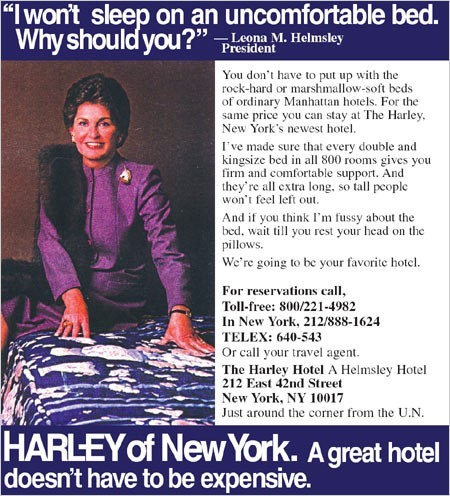
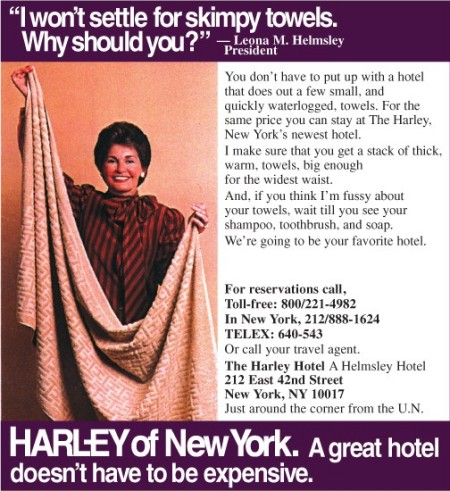

|
Cheating in Sports
You mean there’s cheating in Sports? Oh my gosh. How often does
that happen?
How about all the time!
Cheating is rampant in
sports. Why? Because it pays well. Just ask Lance Armstrong, the
poster boy for the benefits of cheating. Armstrong was so morally
bereft that he sued newspapers – and won – for having the nerve to
suggest he used drugs.
The critics were right
all along but Armstrong could afford lawyers who were not only
equally morally bereft, but also highly talented at keeping evidence
from being introduced.
I always shake my head at
lawyers who defend people they know full well are guilty. How do
these sub-humans sleep at night? You know who I am talking about.
How about people like those lawyers who fight for the tobacco
companies? But we will save that question for another day.
The temptation to cheat
in sports is overwhelming because often the difference between the
best and the also-rans can be measured in seconds and even in split
seconds.
|

Lance didn't
seem to have even the slightest guilty conscience about his constant
lies.
|
| |
|
The Narrow Edge
of Victory
|
Usain
Bolt has won three Gold medals at the Olympics and three Gold medals
and 2 Silver medals at the World Championships. He has been setting
world records since he was a junior competitor and has broken his
own world record in the 100m sprint twice.
At the
2012 London Olympics, the difference between the winner and the
also-rans was actually wider than usual. Usain Bolt of Jamaica
is so dominant that the race was for second place.
Mind
you, I am not saying Usain Bolt uses drugs. I am simply using his
success to point out the value of success. His biggest
sponsorship deal is with Puma which pays about $9 million annually.
How much would he make if he finished second?
Take
note of the bunching in second, third, and fourth. Had Tyson
Gay found a way to slice 1/100th of a second off his time, he would
have medaled at the 2012 London Olympics.
The “Narrow Edge of
Victory” brings out the absolute worst in many human beings.
In
the long distance ski races
of the Winter Olympics such as the 10
kilometer cross country, the top 30 contenders can
finish within 60 seconds of one another
over 10 miles. Given such a narrow margin, it must be maddening to
think that something as difficult to detect as blood doping can take
an athlete from complete obscurity to prominence, glory, and prize
money.
Erythropoiesis-stimulating
agents (ESAs) have a history of use as blood doping agents in
endurance sports such as horseracing, boxing, cycling, rowing,
distance running, race walking, snowshoeing, cross country skiing,
biathlon, and triathlon. With such a narrow margin separating the
top from the bottom, the temptation to use erythropoietin (EPO) is
huge.
EPO is a genetically
engineered version of a natural hormone made by the kidney. EPO
stimulates bone marrow to make red blood cells. It started to
emerge as a factor in the Salt Lake City Olympics in 2002.
Jim Stray-Gunnersen, a
U.S. physician who helped develop blood-doping testing programs in
the 1990s, says effective blood-doping can take endurance athletes
from 30th place all the way to the podium.
Canadian Pierre Harvey, a
cross-country skiing star of the 1980s, tells a fascinating
anecdote. To this day, Harvey recalls how Russians who he could
defeat soundly before and after the Olympics suddenly surged past
him when it really counted at the Calgary Winter Olympics in 1988.
"When I see four Russians finish in the top six at the Olympics,
it's just not normal. In
the next weeks following the 1988 Games, I won several World Cups,
but in the Olympics, I was merely 14th." --
Pierre Harvey
At the time, Harvey
suspected the athletes were using blood doping, where they
transfused higher oxygen content blood into their bodies several
weeks before a key competition.
Not all athletes cheat.
One of the reasons we
admire baseball player Derek Jeter so much is that he has a sterling
reputation. As he retires, his name was never besmirched by
performance enhancing drugs. Not so for his contemporaries Barry
Bonds, Alex Rodriguez, Sammy Sosa, Roger Clemens, Mark McGuire and
so many more.
Incidentally, a couple
years ago I wrote a highly entertaining article on “Olympic
Cheating”. If this is a subject that
interests you, I promise this article is a great read.
|
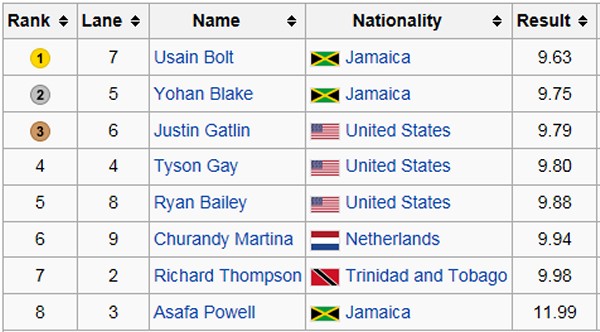

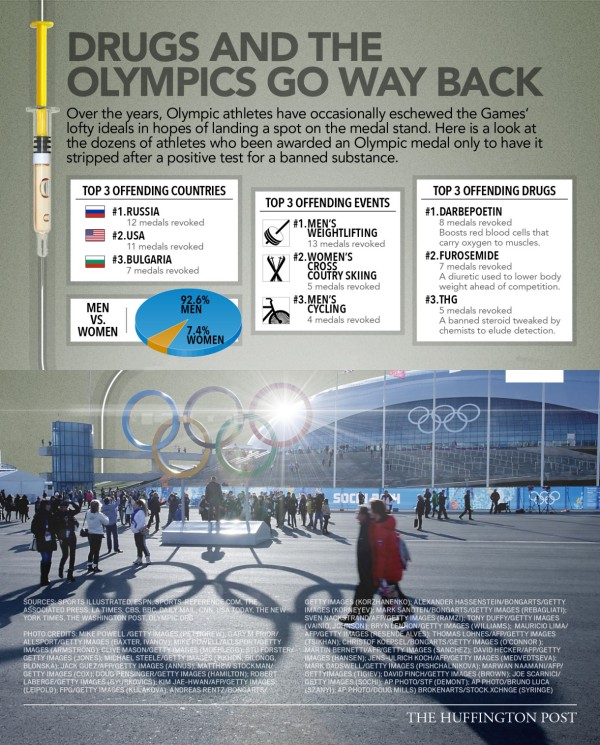
|
Spain Wins
the 2000 Paralympics Gold Medal for Basketball
You will not believe the
lengths some people will go to win.
My favorite
example of the worst cheaters EVER
involves a team of
non-handicapped athletes who pretended to be handicapped so they
could win at the Paralympics!
You of course say ‘No
Way’. Wrong answer. It really did
happen.
The Paralympics is a
noble endeavor that allows handicapped people a chance to compete.
What a wonderful idea, one that is quite in keeping with the Olympic
spirit.
|
The Paralympics has grown
to become a major international multi-sport event where athletes
with a physical disability compete. This includes athletes with
mobility disabilities, amputations, blindness, and cerebral palsy.
In 2000, the Spanish
intellectually-disabled basketball team captured gold at the Sydney
Paralympics with a stellar performance on the court.
But the glory quickly faded when the Spanish Paralympic
Committee later discovered that 10 of the 12 team members had no
mental deficiency whatsover.
It must have been strange
for the athletes to listen to the Spanish coach. “Now listen, boys,
you need play smart and keep your head in the
game, but if someone gets suspicious, don’t forget to act
retarded.”
It is unbelievable the
depths people will crawl to in order to win.
|
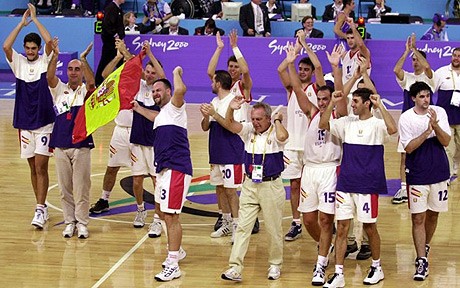 |
| |
|
Cheating at Scrabble
|
Sometimes cheating can be
light-hearted. Is it okay to cheat at board games like Monopoly?
Some people would say that’s the best part of the game!
And what about Scrabble?
Wendy looked down and stared at the board. She had been holding the
“Z” and the “X” for some time now. This was her chance. ‘ZIXIC’ on
a triple-word score. That would win tonight’s game of Scrabble for
sure. No way would Frank overcome a score like that.
So Wendy calmly laid down her five squares. The total was so large
she had to use her calculator.
“Hey, wait a minute!” said Frank. “Zixic. That’s not a word!”
Wendy looked up and smiled at her beleaguered boyfriend. Poor
Frank. He had never beaten her at Scrabble. And he wasn’t going to
win tonight either.
“Of course it’s a word, Frank. Anyone who has been to college knows
that ‘zixic’ is a perfectly acceptable word.”
“Okay, smart girl, use it in a sentence.”
Wendy smiled. “If you insist.”
Wendy’s sentence:
“If only Frank wasn't so ignorant, myopic, and
zixic, he would realize how erroneous ill-informed his challenge
is.”
“You just make this stuff up, don’t you? I don’t believe you. What
does ‘zixic’ mean?”
“It means ‘acidic’ or ‘sarcastic’.”
“Um, my BS detector is going nuts, darling. You don’t expect me to
believe this, do you?”
Wendy laughed out loud. She had never heard Frank swear before, not
even a mild oath such as “B.S.”. There was a chance Frank was
taking Scrabble a little too seriously. But then considering his
losing streak, she could forgive his frustration.
“Oh, come now, Frank, don’t use words like “BS”. That is so ugly.
It isn’t like you to swear at Scrabble.”
“And give me one reason why I should not challenge ‘zixic’?
“Now, Frank, everyone knows you have lost the last two times you
have challenged me. You lost with ‘fangle’ and you lost with ‘gormless’.
Why is it so difficult for you to accept that I make an effort to
learn as many strange words as possible? As it turns out, ‘zixic’
is a perfectly legitimate word just like ‘venic’, ‘vatic’, ‘xeric’,
‘xenic’, ‘yonic’, and ‘zymic’.”
Frank’s jaw dropped. “You have got to be kidding, Wendy. I have
never heard of any of those words in my life!”
Wendy giggled. What Frank didn’t know was that she when he went to
get a beer from the refrigerator, she had googled 5-letter words
ending in “ic”.
Unfortunately, her other letters wouldn’t allow her to spell a word
correctly. This forced her to make up a nonsense word and hope the
other correct words were weird enough to intimidate her boyfriend.
Now it looked like her ploy would work.
“Oh, Frank, you know quixotic and mysterious I can be. Now, are
you going to challenge me or not?”
“No, Wendy, I don’t think I can stand any more humiliation tonight.
I will take your word for it. You win again.”
“Smart man, Frank. Want to play another game?”
“No, I think I’ll pass. I think there’s another beer in the fridge.”
Do people really cheat at Scrabble? Probably. I know I’ve
certainly been tempted to make up a word a time or two. Deep down,
I think there are people out there who will cheat at anything. It
is in their nature.
|
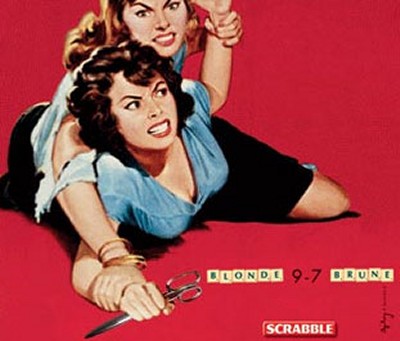
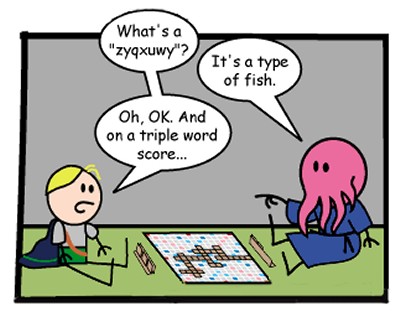
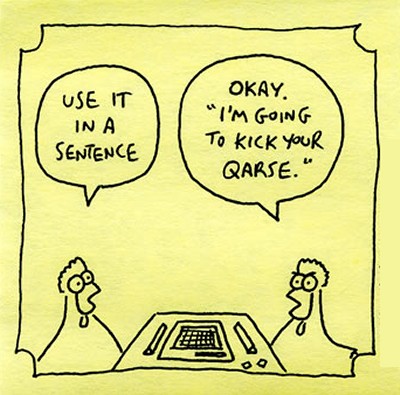
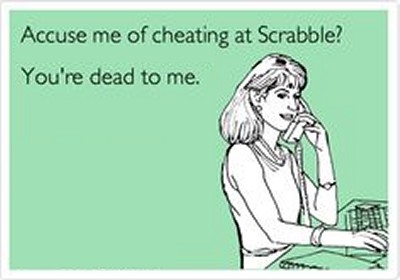
|
Eugene Varshavsky
One of my favorite
stories of cheating involves Eugene Varshavsky. Although no one is
even sure that is his correct name, in certain circles ‘Eugene
Varshavsky’ is extremely famous. Whoever he is, Varshavsky is a man
who likes to cheat.
Varshavsky first came to
fame in the 2006 World Open in Philadelphia where the total prize
money amounted to $358,000,
Varshavsky was one of the
lowest-ranked players in the main tournament, but he started off by
beating two high-ranked masters in his first three games.
After that he beat FM
John Bartholomew, rated 2452, with the black pieces, then lost to GM
Giorgi Kacheishvili, 2643.
Varshavsky rebounded to
defeat GM Ilia Smirin, rated 2659, again with the black pieces, in a
virtually flawless game.
The match against Smirin
was the game that really set the chess beehive abuzz. This was a
brilliant victory against a brutal opponent. Not only had Varshavsky
beaten one of the top players in the world, he did it in fine
technical style - as if he were the world-class grandmaster himself
instead of a complete unknown!
There was no proof that
Eugene Varshavsky, better known as "The Man with the Hat", was using
electronic devices. However, the circumstantial evidence was
overwhelming.
Grandmaster Larry
Christiansen had decided not play at the World Open, but he had come
to watch. He enjoyed being a spectator. GM Christiansen could
barely believe what he was seeing. Grandmaster Ilia Smirin, the
highest rated player in the United States, had just been beaten in
Round 7 by a complete nobody!
Christiansen knew from
experience that GM Ilia Smirin, the man who had gone down to defeat,
was a powerful chess player. Smirin had been beaten by a long
series of very complex moves made by a complete unknown.
Christiansen had never heard of this “Varshavsky” character in his
life nor had he ever seen him before.
Something that really
bothered Christiansen was Varshavsky’s cluelessness at “chess
notation”. Chess notation is the act of writing down each chess
move. Anybody who has ever studied chess quickly learns how to
dictate each move. Chess notation allows players to replay previous
games whenever they wish.
And yet strangely enough,
despite his obvious strength as a chess player, Varshavsky appeared
to have no grasp of chess notation. He struggled to record his moves
(erasing and re-writing throughout), and he clearly had to use the
"A-H" and "1-8" grid-markings on the chess board to identify
squares. This awkwardness was very unsettling.
Varshavsky’s dress raised
huge suspicions. Although this was the start of July, Varshavsky
wore very heavy clothes and a huge drooping bucket hat that hung
low, covering the man’s ears. No one wears a hat at a chess
tournament, and certainly not one as bizarre as this virtual
helmet. Christiansen found it very curious that Varshavsky wore a
hat the entire time. Although it had to be uncomfortable,
Varshavsky never took the hat off.
Christiansen strongly
suspected a cheat. On a whim, Christiansen ran the moves in the
Smirin match through “Shredder”, the World Champion Computer Chess
Program. Christiansen was intrigued by the results. He found that
Varshavsky’s last 25 moves identically matched those played by the
championship chess program. What an interesting coincidence!
After Christiansen passed
his “Shredder” tidbit on to the right people, Bill Goichberg,
director of the World Open, asked to see Varshavsky before the next
round. To Goichberg’s surprise, Varshavsky immediately excused
himself and hurried off to the bathroom.
Varshavsky spent about
ten to twenty minutes in the toilet stall, then came out and
proceeded calmly to the tournament director’s room. Goichberg had
waited in puzzlement outside the restroom stall until Varshavsky
came out. What was Varshavsky doing in there?
Now Varshavsky consented
to be searched. The search revealed nothing. No electronic device
was found. So Varshavsky was allowed to proceed in the tournament.
Strangely, after the
search was complete, Varshavsky went back to the same toilet stall
and spent another twenty minutes in there. Nobody had thought to
check the toilet stall after he had left the first time. Had
Varshavsky left something behind perhaps?
Later, a second attempt
was made to search him. Varshavsky immediately repeated the
bathroom routine. He bolted and quite possibly got rid of whatever
he had hidden in his hat before he was searched.
Again, the second search
revealed nothing.
Varshavsky came to the
board for Round 8 wearing his usual hat. Assistant tournament
director Carol Jarecki told him that he had to take his hat off
while playing the game.
Varshavsky argued
vehemently, but Jarecki stood her ground. Eventually Varshavsky
complied, and he lost easily to Grandmaster Najer.
Varshavsky showed up for
the next match against GM Panchanathan wearing his hat again.
Again he was told to
forget the hat. Varshavsky was involved in several discussions with
the tournament directors, but got nowhere. Varshavsky played this
game without the hat and again lost easily.
Round One: Half Point bye
Round Two: Defeated FM Farai Mandizha 2369 (With Hat)
Round Three: Drew WGM Nisha Mohota 2387 (With Hat)
Round Four: Defeated FM Robby Adamson 2394 (With Hat)
Round Five: Defeated FM John Bartholomew 2452 (W. Hat)
Round Six: Lost to GM Giorgi Kacheishvili 2643 (With Hat)
Round Seven: Defeated GM Ilya Smirin 2800 (With Hat)
Round Eight (Without Hat): Lost to GM Evgeny Najer 2697
Round Nine (Without Hat): Lost to GM Magesh C.
Panchanathan 2569
These results
speak volumes. Playing against very powerful opponents with the
hat, Varshavsky won four matches, drew one, and lost one. Playing
without the hat, Varshavsky lost quickly twice.
Varshavsky never
played in another major chess event, at least not under that name.
However, Eugene
Varshavsky would resurface three years later. Yes, the man with the
hat would indeed rise to the forefront one more time, except this
time he showed up wearing a hood.
In 2009, Eugene
Varshavsky entered the Philadelphia Inquirer National Sudoku
Championship.
Varshavsky did
quite well. In fact, Varshavsky made the Finals!
Believe it or
not, this total unknown in the world of Sudoku surprised everyone by
completing three difficult puzzles in just 14 minutes.
Varshavsky was a
major star. These were the best of the best, yet he made the final
three out of 646 contestants.
At the time, no
one knew about the chess tournament incident three years earlier.
Nevertheless, Varshavsky had raised new suspicions with his
success. People can be so ugly when a nobody suddenly begins to
beat all the somebodies. One thing his critics pointed out was that
Varshavsky was notably wearing a hood over his head. How catty!
Here the guy kicks supreme bootie and all people can do is criticize
what the man wears.
Thanks to all the
‘fashion complaints’, Varshavsky was not allowed to have his hood up
in the finals. In addition he was forced to solve a puzzle on stage
before a live audience.
In the finals,
Varshavsky did not do very well. For the majority of the time,
Varshavsky just stood there staring blankly at the board. He only
solved two of the missing clues. This was a rather pitiful showing
considering the other two contestants found answers to all 81
squares.
|
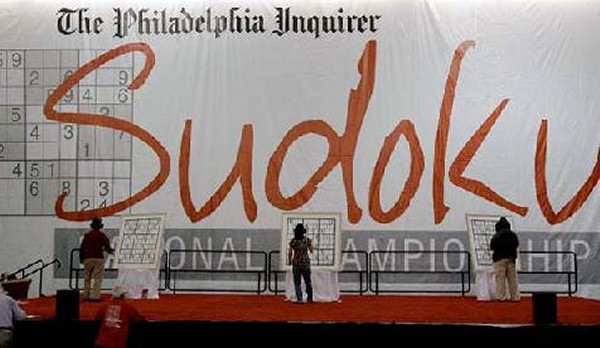
This is a
picture of the 2009 Sudoku Finals held in Philadelphia.
Varshavsky is on the right.
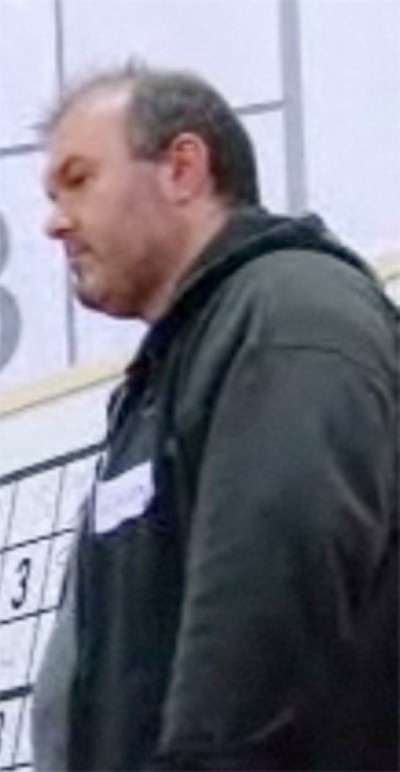
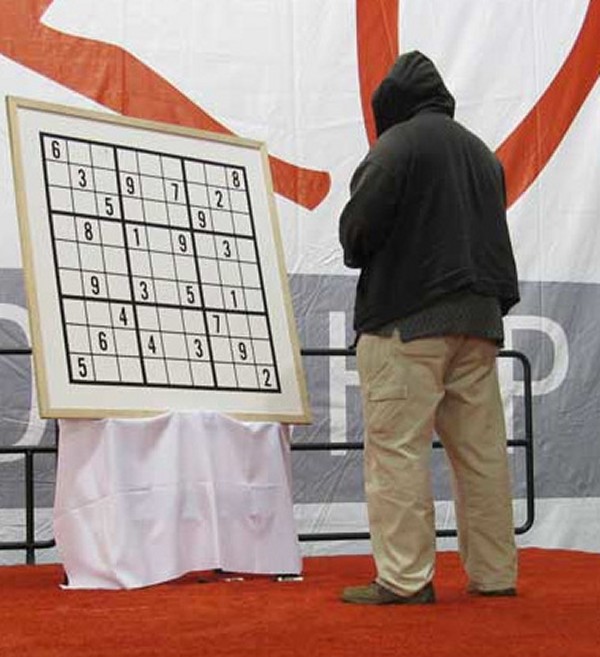
This board is
the Finals puzzle. If you are a Sudoku player, you will spot
an automatic "5" and an automatic "9" on the board.
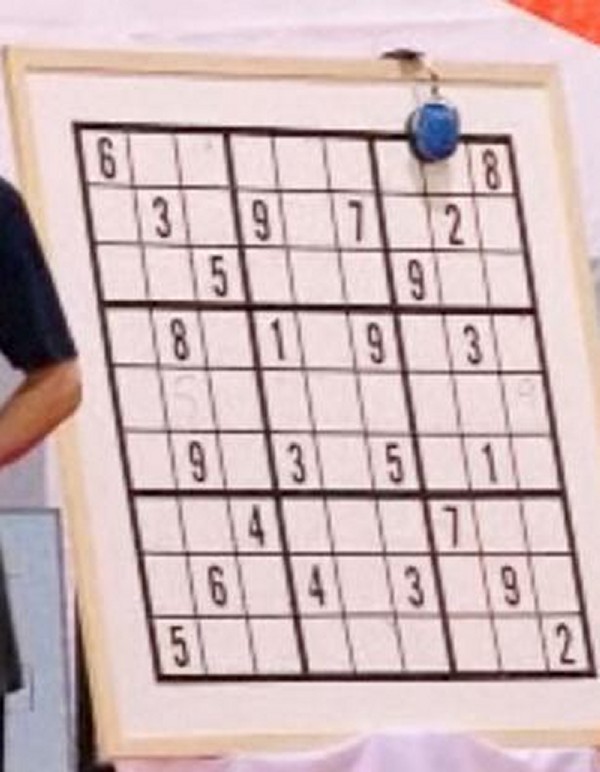
Rick's Note:
Those two automatic answers - the 5 and the 9 - were the only two
clues filled in by Varshavsky. He left the rest of the puzzle
completely blank.
Let me add the
Sudoku Finals puzzle was not that difficult! I solved it
myself and I am hardly an ace. I believe any experienced
Sudoku person could solve it without too much trouble given enough
time. Indeed, several people commented the Finals puzzle was not
that tough. And yet Varshavsky only got two spots solved.
My point is
that if I am clearly a better Sudoku player than this guy and I
don't consider myself a championship player, then how is it
possible for someone who is playing at a level no better than a
"beginner" make it to the Finals?
This explains
why everyone in the building suspected Varshavsky had cheated his
way to the Finals.
|
Given the ease of
the Finals puzzle, people began to be suspicious.
Nevertheless,
despite his poor showing in the Finals, Varshavsky was awarded third
place and won $3,000 for his efforts.
Now the tongues
began to wag. The tournament officials were having doubts of their
own.
So Varshavsky was
called in for a re-testing. He was given the same puzzle that he
blazed through earlier. This time with people watching, Varshavsky
completed only nine of the 81 digits in 15 minutes.
After failing the
retest miserably, the officials of The Philadelphia Inquirer
National Sudoku Championship stripped Varshavsky of his third-place
position (and $3000).
Varshavsky has not been
seen nor heard from since. He gave the organizers a fake address,
so no one has any way to track him down. Nor does anyone care.
What a pathetic human being.
|
Boris Ivanov
Borislav Ivanov is a highly
controversial Bulgarian chess Master. During 2012 and 2013,
Ivanov's results
improved significantly, and he beat several grandmasters
ranked far above him. A
combination of uncooperative behavior mixed with his rapid improvement
led to cheating accusations against him.
Ivanov's current ranking
is FM... short for FIDE Master.
The World Chess Federation,
FIDE (Fédération Internationale des Échecs), awards several
performance-based titles to chess players.
GM: Grandmaster.
IM: International Master. FM: FIDE Master.
CM: Candidate Master.
Introduced in 1978, FM ranks below the title of International
Master but ahead of Candidate Master. The most usual way for a
player to qualify for the FIDE Master title is by achieving a rating
of 2300 or more.
|
Boris
Ivanov’s major breakthrough
came at the strong December 2012 Zadar Open chess tournament in
Croatia. Ivanov finished in fourth place after defeating a number of
higher-ranked players and increased his rating by 70 points,
an enormous jump. His
tournament record against the grandmasters he faced was 3 wins, 2 draws
and 1 loss.
At the time, it was alleged that he had been using outside
help, but no evidence was uncovered. Ivanov received an apology and
an invitation to future tournaments from the organizers.
On 14 April 2013, Ivanov
defeated GM Kiril Georgiev, the current Bulgarian champion, in
a tournament held in Kyustendil, Bulgaria. Kiril Georgiev alleged
irregularities in the nature of Ivanov's tournament play, but
no action was taken. Ivanov
dismissed Georgiev as a sore loser.
Chess commentator Alex
Karaivanov had this to say:
The
case of FM Borislav Ivanov, who mysteriously beat a number of highly
ranked chess players at several European international tournaments,
remains unsolved. Was he cheating or is he a pure genius whom no one
wants to accept?
Ivanov’s play has repeatedly demonstrated an unprecedentedly high move
correlation with that of the strongest chess engine, Houdini.
His sharp computer style is easy to
recognize for all experienced masters and professional players, who
recently signed petitions demanding an anti-cheating commission be
formed to deal with the growing problem of computer cheating in chess
tournaments. However, nothing came of it.
Meanwhile, Borislav Ivanov
continued to beat everyone who dared to sit at the same table with him.
He convincingly won the top prizes at tournaments in Sofia (Bulgaria),
Zadar (Croatia), and Villava (Spain) throughout 2013. While his strong
play continued to dominate local and international competitions, his
victories came against a backdrop of bitter speculations and
suspicions. His success led his fellow grandmasters to seek a showdown.
|

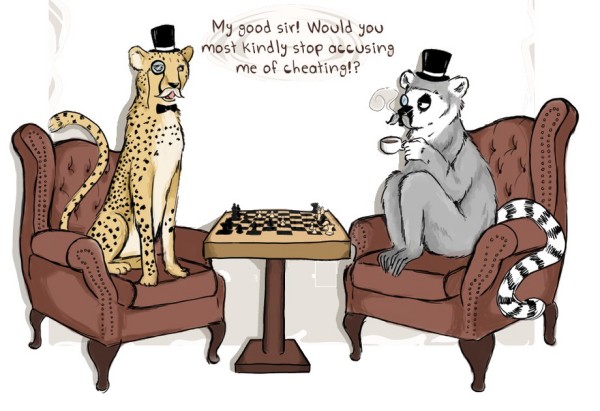 |
Just such a thing happened in
October 2013 at the Blagoevgrad Open in Bulgaria.
Once again, Ivanov got off to
a hot start, and the top players in the tournament began to ask
organizers to search him. GM Maxim Dlugy had a theory as to how Ivanov
was cheating. He believed that Ivanov was hiding something in his shoes,
pointing out the large size of his sneakers and the manner in which
Ivanov was walking.
In Round Seven, Dlugy and
Ivanov were scheduled to play one another. Dlugy first asked for a
body check before their encounter in round seven. After the metal
detector found nothing, Dlugy then asked for the shoes to be checked.
That’s when Dlugy made a surprise move – he took off his own shoes and
dared Ivanov to do the same.
Here is what happened
according to an interview with GM Max Dlugy.
“Without a word I take off my shoes, I take off my socks and throw them
to the floor – just ba-doom, there, I’m done, bare feet, now show me
your shoes, please.
What
happened next was completely unexpected. The guy (Ivanov) just goes “I
categorically will not take off my shoes. My socks smell.”
At
this point my friend says: “I guess that would be forfeit, right?”
Ivanov says: “if you have to forfeit me, forfeit me. But I will not
take off my shoes.”
The
arbiter said to Ivanov: “You realize that you will not only lose this
match, but I will also have to disqualify you from continuing to play in
the tournament, and no one will play you ever again. All you have to do
is to take off your shoes.”
Ivanov shook his head no.
The
arbiter actually tried to convince him for another couple of minutes,
but Borislav was categorical about it: “No way I’m taking off my shoes.
No way!”
So
the director shrugs and says “Okay, I’m putting in a zero.”
After this incident, a theory was started about what might be happening
here. A modern Android or Apple smartphone easily fits into a shoe. A
person can use his toes to send signals to the motion detector in the
phone. Little wiggles will do it. Or the toe can be used to tap on the
LED screen. The response of the phone would be short bursts of
vibration. An app could handle the interface to a chess engine running
on the device.
(Rick’s
note: Did this explanation make any sense to you? It didn’t to
me.)
Two months later, another
ugly confrontation took place. Ivanov was tied for the lead in a major
tournament held in Spain, the December 2013 Navalmoral de la Mata Open.
When Ivanov showed up for his
Round Six match with GM Namig Guliyev of Azerbaijan, the man he was tied
with, Guliyev decided to confront Ivanov in the same manner as Dlugy had
two months earlier. Guliyev asked to have Ivanov's shoes examined to
see if he was hiding a sophisticated device.
Ivanov refused. This time
there was less fuss because the tournament officials quickly awarded the
game to Guliyev. In addition Ivanov was disqualified from participating
in the final round. In a sense, Ivanov’s reputation had fallen so low
the directors simply had no patience for his behavior.
As it stands, Boris Ivanov
has never been caught red-handed, but in the world of chess, very few
people believe the man is honest.
|
1975:
The Italian Toe
Tapping Bridge Scandal
|
We have read about cheating
in Chess and in Sudoku. Another game people like to cheat at
is Bridge. This complicated card game has seen more than its
share of scandals. Over the years, there have been several dramatic
cheating incidents at major tournaments.
Bridge lends itself to
cheating because it involves “communication” between partners. A
critical part of the game involves bidding. If two players are on the
same wave length, it almost seems like they are reading one another’s
mind. Indeed, if two psychics were to team up, I imagine they would be
unbeatable.
Fortunately, most psychics are either not interested in bridge or not
interested in cheating. However, over the years some of the most
talented bridge players in the world have been tempted to use signals to
improve their bidding accuracy.
One of the most famous
scandals was known as the “Bermuda Incident”. The annual Bermuda Bowl
world championship saw Italy and the United States playing in the 1975
final held in Southampton, Bermuda.
|
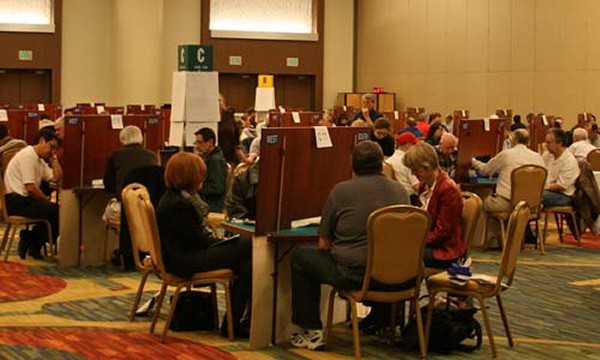
Note the
screens. This feature was added to tournaments to prevent
cheating by using signals. Thanks to the Italian team accused
of cheating, leg barriers were added as well.
|
American reporter Bruce
Keidan uncovered one of the most infamous cheating scandals ever.
While watching one of the
Italian pairs, Gianfranco Facchini and Sergio Zucchelli, Keidan noticed
unusual foot actions between the two. The reporter found the players
tapping each other's feet under the table in an apparent attempt to
relay information about their hands.
Keidan's discovery, which was
confirmed by several witnesses, was eventually presented to the
presiding authorities of the event, who "severely reprimanded" Facchini
and Zucchelli for their activity. Amazingly, these two were allowed to
continue competing in the event, but with one rather amusing change.
The Bermuda Bowl authorities placed blocks underneath the tables to
prevent any further foot contact.
American captain Alfred
Sheinwold was angered by the decision and stated that his team would
resign from the match. Sheinwold changed his mind under duress.
Threats made to Sheinwold by the United States' governing body, the
American Contract Bridge League, coerced Sheinwold and his team into
finishing the event.
Incredibly, Italy went on to
win the event, 215 – 189, thereby proving once and for all that cheaters
do win.
By all accounts, Facchini and
Zucchelli quickly faded from the international bridge circuit
thereafter.
|
2013: The
German Doctors
|
|
Did you know the 2013 world
champion bridge players were stripped of their title after being
convicted of cheating?
Michael Elinescu, 61, and
Entscho Wladow, 71, have been stripped of their gold medals won in
September 2013 at the world championships held on the paradise island of
Bali.
They are the unlikeliest of
cheats. Both men are distinguished medical doctors and brilliant bridge
players. In the world of bridge, they are known, in part reverentially,
as “The German Doctors”.
Well, now the German doctors
have lost their marvelous reputation. They have been found guilty of
cheating by exchanging coded signals through coughing.
Their
coughing deception seemed to closely
parallel the case of Charles Ingram who used a system of coughs to win
the £1 million jackpot prize on the British game show Who Wants To Be
a Millionaire?
|
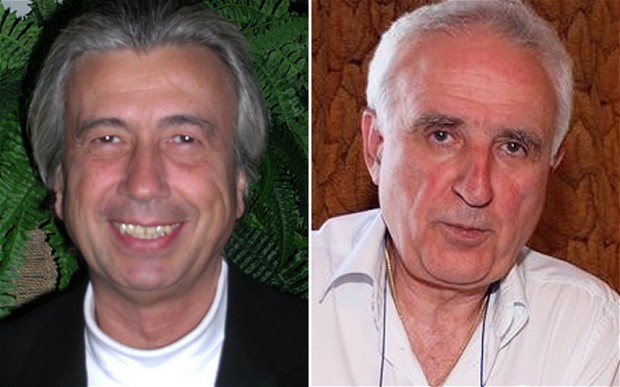
Michael Elinescu
and Entscho Wladow
|
More than 500 competitors
took part in the world championships held at the Nusa Dua resort in
Bali, which was televised around the world on the internet. The location
was suitably glamorous for the Miss World finals to be held at the same
venue a week later.
The German doctors were
investigated following a complaint by their American opponents in the
finals of the d’Orsi World Senior Bowl, the most important event in the
bridge calendar.
As the bridge final unfolded,
Eddie Wold, a US player
from Houston, became suspicious of the Germans and
their constant coughs. He began noting down when they coughed and how
that corresponded with the cards they had.
Wold passed his evidence to
Max Bavin, the English chief referee, who authorized secret monitoring
and video surveillance of the game as it progressed.
After a lengthy investigation
that involved the computer analysis of a video recording of their
victory in the final, the game’s governing body concluded that the two
men used a system of coughs to indicate what cards they had.
In a 16-page report, the
World Bridge Federation concluded that Elinescu and Wladow coughed if
they had fewer than two cards in a certain suit - and that the number of
times they coughed indicated in which suit they had a shortage of
cards. This was very valuable information.
After studying the evidence,
the WBF also found that the pair had a separate coded coughing system to
indicate the “preferred lead” when the hands were being played. This
cough system gave the men an unfair advantage over their opponents. In
some circles, an “unfair advantage” is also known as “cheating”.
The WBF concluded the report
by calling the behavior of the two doctors “reprehensible”.
|
The 1965 Buenos Aires Bridge
Scandal
|
Perhaps the most famous
bridge scandal of all took place at the 1965 Bermuda Bowl held in Buenos
Aires, Argentina. This scandal involved the infamous finger-signaling
technique.
British bridge experts
Terence Reese and Boris Schapiro were accused by American players Jay
Becker and Dorothy Hayden of using finger patterns to convey bidding
information. The two British players were seen holding their cards with
different numbers of fingers in accordance with the number of hearts
they held. For example, three fingers meant three hearts.
When the allegations leaked
out during the event, British captain Ralph Swimer forfeited all his
team's matches and withdrew Great Britain from the competition. The
degree of correlation between fingers and hearts was very high; however,
it is debatable how much the Reese-Schapiro team benefited from the
alleged exchange of information.
Those who sided with the
British players argued the latter, suggesting that it was improbable the
British pair was cheating if it never gained points on the deals in
question. In other words, if you can’t win by cheating, then you must
not be cheating.
The British Bridge League
eventually found Reese and Schapiro innocent of cheating; however, the
World Bridge Federation found them guilty and banned them from WBF
events for three years.
These conflicting decisions
bring up an interesting point. Throughout these various stories, people
seem to bend over backwards to give the benefit of the doubt to the ones
being accused. The reason for this seems to be the fact that no one
ever gets caught red-handed.
Usually it is only a careful
after-the-fact analysis of videotape where certainty begins to show. In
the case of the Buenos Aires event, there were photographs, but no
video. So the level of certainty was in doubt. It all boiled down to
circumstantial evidence. Considering the damage to someone’s
reputation, no one wishes to confront a world-class athlete or a game
expert with allegations of cheating based on circumstantial evidence.
Therefore it seems to take a
lot of guts for someone to accuse a peer of cheating in the manner that
Eddie Wold, the man who pointed out the strange coughing behavior of the
German doctors.
On the other hand, the
ambiguity surrounding the Buenos Aires Bridge Scandal made for very
interesting debate. In an attempt to clear his name, British bridge
expert Terence Reese wrote a long book in his defense.
Then Bridge
writer Alan Truscott turned around and wrote a book about the affair
entitled The Great Bridge Scandal that seemed to leave little
doubt about Terence Reese’s guilt.
|

Here Reese
shows 3 fingers on the backs of the cards and has three hearts. The
British Captain, Ralph Swimer sits to the right of Reese watching
carefully for signs of cheating. He is taking notes
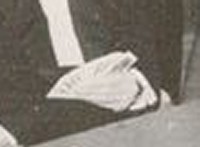
3 fingers on the
backs of the cards
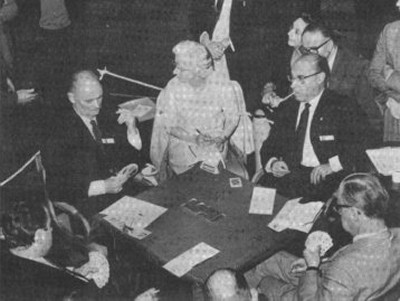
Great Britain
versus Italy. Terence Reese (upper left) holds two fingers
stretched, in V-formation. On this deal he held two hearts.
Rick's Note:
The best explanation of the story on the Internet was written by
Onno Eskes
|
A man named David Straight
wrote a brilliant review of Truscott’s book.
I would like to share Mr.
Straight’s letter.
“I
bought this book shortly after it first came out in hardback, and it was
truly an eye-opening work. I had a student who was a tournament bridge
player some years ago--he dismissed the idea out of hand that Reese and
Schapiro, who were certainly one of the top bridge partnerships, would
ever cheat. My student thought the charges were frivolous, the idea
ridiculous.
So I
loaned him my copy of the book. Truscott has been a careful person. The
book details at great length several individual hands. You will see
photographs of Reese and Schapiro holding their cards in a variety of
ways--fingers were used to indicate the number of hearts that they held.
When you sometimes have one finger out, sometimes two, sometimes three,
sometimes split your fingers (think of Spock on Star Trek), etc,
it can look awkward. My student was convinced by the book, but was a
sadder person.
The
natural reaction is "Reese is a top player. He doesn't have to cheat".
That's very true.
But
it's also true that baseball players such as Bonds, McGwire, and Sosa
didn't "have to" cheat: neither do Tour de France racers, nor did other
similar figures. But steroids and corked bats (in Sosa's case) and other
drugs were indeed used.
If
you're in, say, the top 10 of your field, the possibility may arise to
improve to the top 3, for example, by cheating. The motivations may
vary from the money involved to ego and not liking to lose.
Truscott's book relates how Reese had boasted to friends (and offered to
bet on it) that he could cheat at bridge without anyone being able to
detect his methods: this sounds like an ego trip, for there was
certainly no need for a person of Reese's ability to cheat.
Truscott's book describes previous occasions of cheating in bridge, and
it relates the disillusionment felt by people who watched Reese and
Schapiro at the table exchanging signals. Hands are shown where the
bidding and play--such as the opening lead--make no sense at all unless
you know much more about your partner's hand than you should.
A
hearing was held in England--the chair of which knew relatively little
about the game, and so would have been blissfully unaware of when
bidding or play would have been unusual. Confessions were basically
ignored, and Reese and Schapiro were acquitted.
But
innocent? Read the book.
Bobby Wolff has a fine new book out: "Lone Wolff" which describes
cheating and what might politely be termed "ethical lapses". You'll find
in this book numerous cases of where when cheating was discovered in a
tournament the culprits were let off.
One
of the most egregious cases was (as I recall) in the 1975 Bermuda Bowl
where an Italian team of less than stellar bridge gifts but with a
series of remarkable performances were caught exchanging information
through foot-tapping under the table. The team was reprimanded, but
allowed to continue in the tournament.
Reese and Schapiro had vastly more natural talent than this Italian
team. Schapiro told the British captain that Reese had pressured him
into cheating, so we still have the bewildering question of just why
Reese would do such a thing.
But
we have also seen people like the fabulously wealthy Leona Helmsley and
Martha Stewart dig themselves into deep holes over what was (for them)
trifling sums.
So
Truscott's book is a wonderful point to the idea of what you want to
believe is not always what you need to believe.
|
|